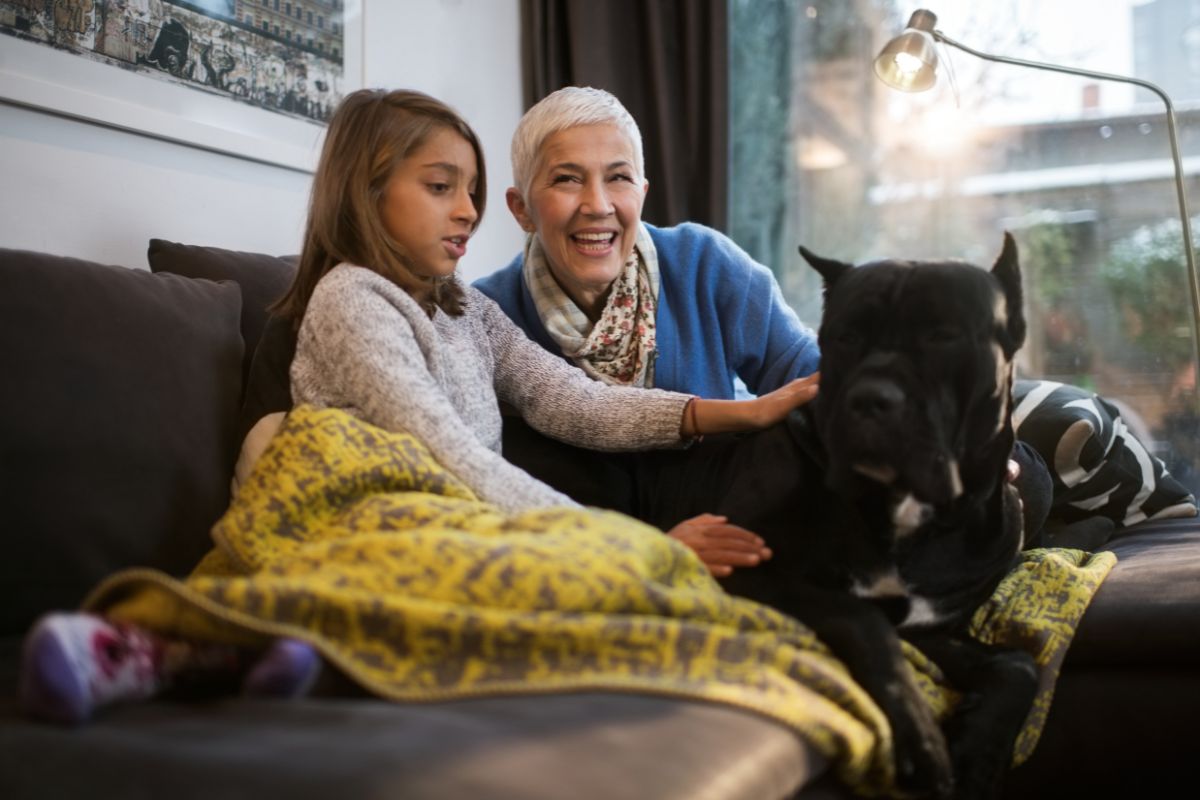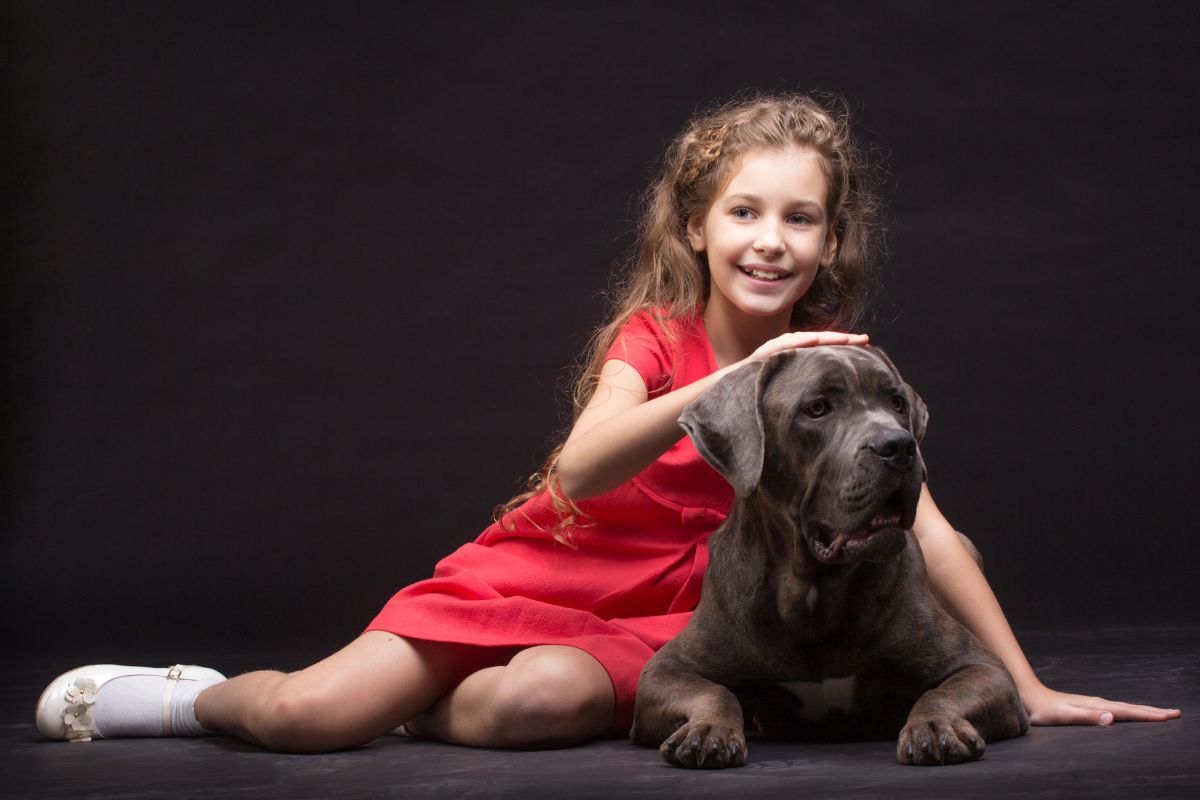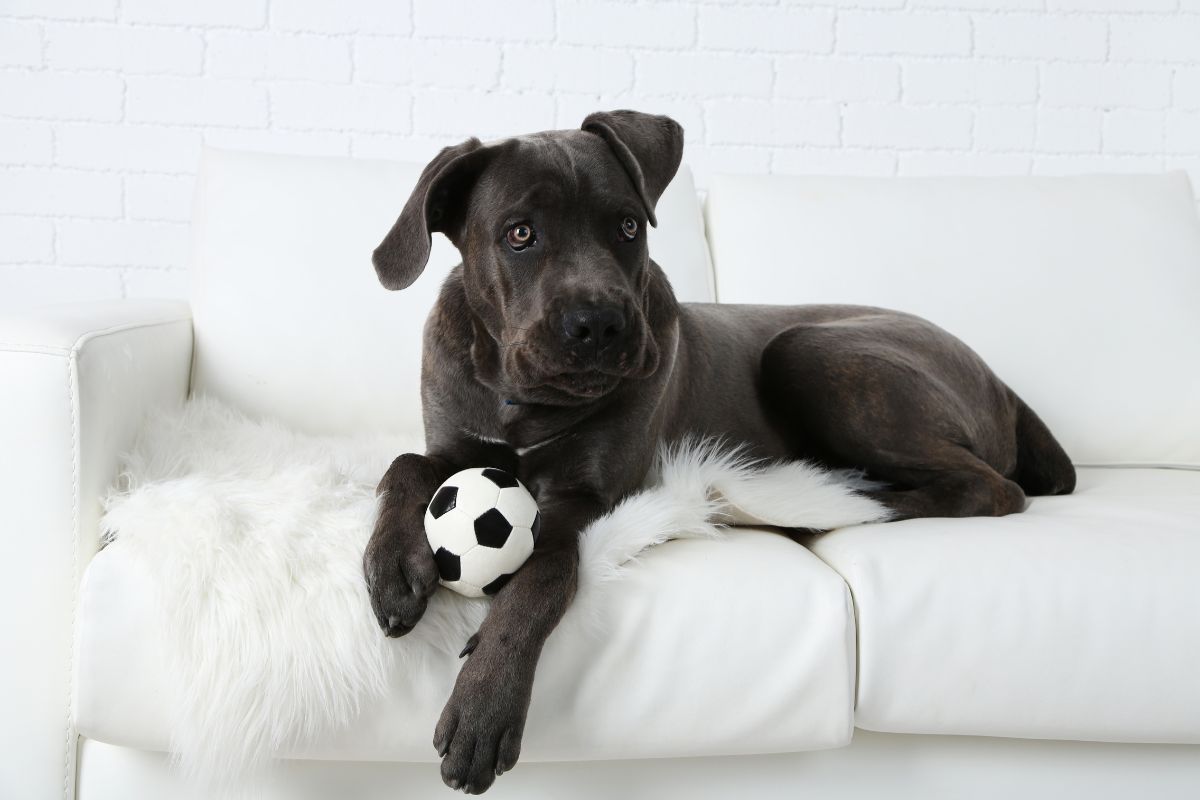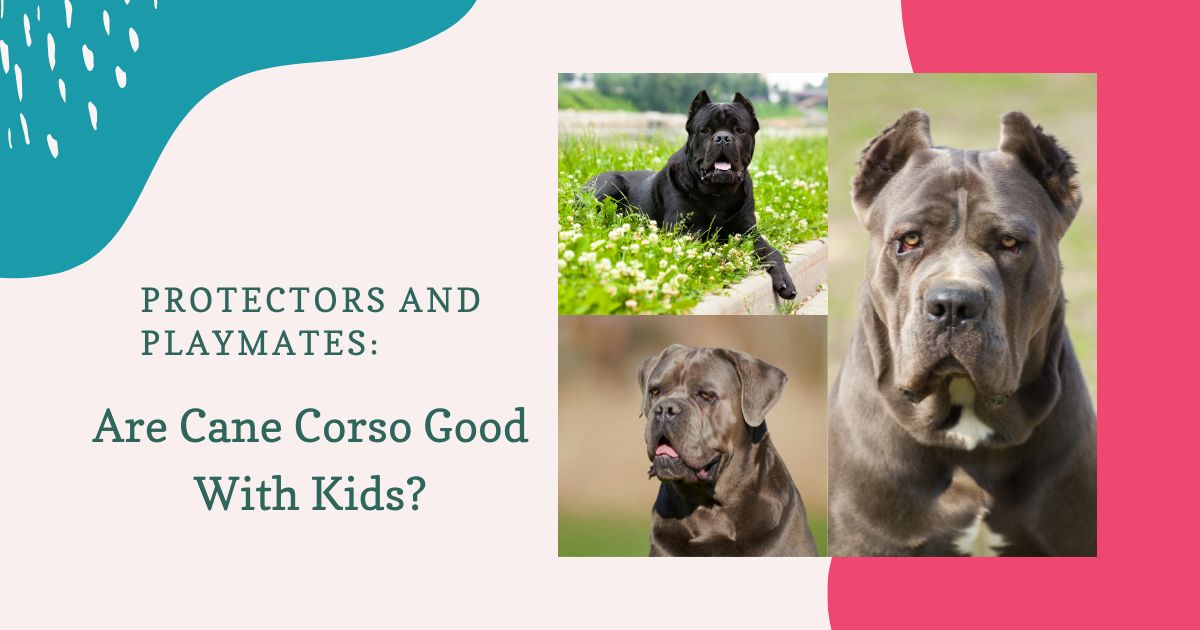What is a Cane Corso?
This is a powerful and majestic dog breed. But their intimidating appearance might make you wonder; are Cane Corsos good with kids? The answer depends on various factors such as temperament, training, and socialization.
In this article, we will explore the characteristics of this dog breed and provide insights into whether they can make suitable protectors and playmates for children. Keep reading to find out!

Are Cane Corsos Good With Kids?
Cane Corsos are usually good with kids and make an excellent breed for families. They possess a protective instinct and will guard their family members, especially children. It would help if you socialized with them from a tender age to avoid aggressive behavior around kids. Let’s look at how good they are with children of different ages.
Cane Corsos and Infants (Babies)
They are great at protecting and bonding with their family or pack. When they understand that the baby is a permanent member of the family, you will notice specific changes in their behavior, such as:
- Increased attentiveness and protectiveness of the baby.
- Lying on the doorstep of the baby’s room.
- Sleeping near the baby.
- Licking the baby when it is upset.
- More relaxed body posture, such as tail wagging.
- Walking slower and with more caution around the baby.
It can be adorable to see kids playing with this dog breed puppies, but it’s important to consider potential risks for both the child and the pup. A Cane Corso 1-year-old is still a puppy and needs to be handled with care. Teach your children how to interact properly with the dog.
At this stage, the puppy and the child are unpredictable and haven’t developed cognitive reasoning. The puppy might accidentally hurt the child with their sharp claws and teeth, while the child may also harm the puppy with their unforeseeable actions.
It’s essential to supervise your dog at all times to prevent behavior issues and to ensure your child doesn’t develop a fear of dogs.
This breed tends to protect the most vulnerable members of the household, including babies. However, if the child is bothersome, the dog may retreat to a quieter spot in the house to rest.
Sometimes these dogs may become jealous of a child, but they typically won’t behave aggressively toward it. Instead, they may whine or bark to let you know they want some attention too, which is understandable considering the baby receives much attention.
Here are some guidelines for effectively raising a Cane Corso baby when you have a small child.
- Make sure to supervise the puppy and child at all times.
- Make sure your child doesn’t treat the puppy like a toy.
- Ensure your child does not bite, pinch, or pull the puppy.
- Make sure your child is not clawed or bitten by the puppy.
- Provide instructions on how to play gently.
- Please do not allow them to scare one another, as this could lead to them developing fear in the future.
- Raising a Cane Corso puppy while having small children is possible and can benefit both the puppy and the children. Don’t let anyone tell you otherwise.
Cane Corsos and Toddlers
Since toddlers are more active, you must ensure your dog is comfortable with them.
Young children tend to jump on dogs and engage in behaviors like pinching, poking, and pulling their ears. Even an extremely friendly and well-trained Corso may become annoyed by these actions over time. It is essential to supervise your toddler when they are playing with the dog.
As your Cane Corso is a highly energetic dog, it is good news that your toddler is now less fragile and full of energy. They will likely become great friends and enjoy playing together. It is hard to say who has more energy, but ensuring they both get enough rest and stay hydrated is vital, as things will likely become very active in your home.
However, it’s best to start socializing your dog to toddlers as early as possible. Usually, they are patient and gentle with toddlers as long as you give them proper training.
Cane Corsos and Older Kids
They are very loyal and become great companions for your children as they grow up. Older kids will likely enjoy playing with it, and the dog will enjoy their company. You can involve your growing kids in caring for your dog as they become teenagers.
They can help with tasks such as walking, feeding, grooming, and training when old enough. This activity will strengthen their bond with the dog and increase your child’s confidence. Additionally, it will teach your kids about responsibility and develop good work habits through the added task of taking care of the dog.
The dog will be less tense now that it’s not dealing with a toddler’s unpredictable behavior. Also, your older child will likely have even more energy and enthusiasm for playing with it. Having a Cane Corso as a childhood pet is a beautiful experience.
However, creating joyful memories with them is essential as we, unfortunately, outlive our beloved pets for a significant amount of time. Cherish those memories forever.
The Cane Corso as a Pet – What to Expect
The Cane Corso is a loyal and intelligent breed of dog. It is important to remember that this breed is a guard dog, so they are naturally protective and may bark if they sense danger. It is essential to teach your Cane Corso when it’s appropriate to be protective and when not. Otherwise, they may become defensive.
To avoid any accidents, such as bites or scratches from your dog, it’s essential to teach your children how to play with them properly. This means showing them how to avoid pinching, startling, or being too rough, as these behaviors may provoke the dog to respond aggressively.
Teach your children these positive behaviors when interacting with your pet.
- Avoid pulling, pinching, and blowing air into ears or eyes.
- Don’t startle a sleeping dog or the one focusing on something else.
- Riding this breed like a horse is not advisable.
- When the dog is eating, please give it space.
- Do not pressure your dog to do something it doesn’t want.
- When training your dog, involve all of your children so they can learn how to interact with each other. Let your kids know this breed is not a toy but a vital family member.
The Dog Breed’s Temperament
These dogs have a reputation for being loving and protective. Their physically imposing, muscular build complements their natural talents as watchdogs and guardians, making them excellent companion guard dogs.
Cane Corsos are affectionate with family members (including children) and occasionally others they come into contact with daily. However, due to their protective instincts, they can be unwelcoming towards strangers, infrequent visitors, or other dogs and their companions.
If you have this breed as a family dog and it seems to avoid or ignore a new baby in the room, it may feel jealous or left out. In such a case, it is vital for parents not to leave the baby alone with the dog. However, Corso can develop an attachment toward children involved in their upbringing.

Training and Socializing a Cane Corso
Training and socializing a Cane Corso requires time, patience, and consistency. This breed is known for its loyalty and protectiveness, which makes it essential to properly train and socialize them to ensure they are well-behaved and obedient.
Socializing
We recommend that your puppy’s breeder starts the socialization process at four weeks old. A critical socialization period ends when your puppy is around 16 weeks old.
Therefore, it’s essential to socialize your Corso puppy as early and frequently as possible by exposing them to new people, animals, sights, sounds, and experiences. The objective is to eliminate fear and prevent unsuitable protectiveness or aggression toward new individuals, animals, or situations.
Here are some more tips for socializing your Cane Corso:
- Socialize with other dogs:
- Introduce this breed to other dogs slowly and carefully, preferably with friendly and well-behaved dogs.
- Gradually increase the duration of the interaction and monitor your dog’s behavior.
- If your dog shows signs of aggression or fear, stop the interaction and try again later.
- Socialize with people: Similarly, introduce your dog to different people in a controlled environment. Encourage your dog to interact with them by offering treats and praise. Make sure to expose them to people of different ages, genders, and races.
Important things to note:
- Ensure that the initial socialization experiences are enjoyable and friendly by verifying that:
- Do not force interaction between them with people or other animals.
- Please don’t force individuals who fear or dislike for dogs to interact with them.
- First, you introduce them to some older children who have prior experience with dogs.
- Ensure the first dogs they interact with are small and not aggressive.
Training
Training this breed can be a challenge. However, it is possible to achieve successful results with patience and consistency.
Here are some tips for training your dog:
Positive Reinforcement
Rewarding your Cane Corso with treats and praise will encourage them to learn faster. This can make training more enjoyable for both of you.
Crate Training
The Cane Corso Association of America (CCAA) advises against allowing your dog to sleep with you or snuggle on the sofa, as it may lead to dominance issues in the future. Instead, they suggest crate training to establish proper household hierarchy and prevent a spoiled or entitled attitude in your pet.
Introducing a crate to your puppy gives them a calm and secure place to rest, process information, and recharge. Puppies, like human children, can get easily stimulated and require alone time to reset. Start crate training your puppy early and associate it with positive experiences like food, toys, and treats.
Obedience Training
Starting obedience training at a young age will help develop a solid bond between your dog and children and form kid-friendly habits and behaviors. The earlier you begin, the easier it will be.
Training this breed with every command is unnecessary, but it’s advisable to at least focus on the basics. For instance, you can commence by teaching them these commands:
- Sit: Making your dog sit down is crucial for starting obedience training.
- Heel: This command will teach it to walk beside you instead of ahead. It will improve your control over your dog.
- Down: This command can be challenging, but it is an effective way to help your dog become more relaxed and calm.
- Leave it: Use this command to stop your dog when its prey drive activates.
- Stay: This command is vital for teaching your dog self-control.
Obedience training is essential for several reasons. It allows you to control your dog and prevent aggressive behavior towards children. With training, it can be easier to communicate with your dog when they become too rough.
Training is vital for this breed as they can be impatient with children they are not familiar with. If your dog reacts poorly to rough handling from an unfamiliar child, it is crucial to be able to restrain them and have them follow your commands.
Why are Cane Corsos Good With Kids?
Cane Corsos are often described as gentle giants and are known to be good with children for several reasons.
They’re Good Guardians for Kids
These breed are loyal and protective dogs, which means they will naturally be inclined to look after the younger members of their human family. This protective instinct also means that they will be attentive to any potential dangers or threats to their young charges, helping to keep them safe.
The Cane Corso is Calm and Reserved
If you have young children, avoiding high-energy dog breeds is best, especially when dealing with bigger dogs. Even if the dog is friendly and kind, their size and energy can cause them to accidentally knock down small children without realizing it.
Fortunately for parents, Cane Corsos are typically very calm and even-tempered dogs, making them less likely to become overly excited or aggressive around children. While puppies can be pretty active, adult Corsos generally become more laid-back. Also, more relaxed dogs, such as this breed, are more consistent in their behavior.
They are unlikely to start jumping or lunging at children suddenly. When the dog is calm and composed, it is easier for kids to establish a bond with them.
Cane Corsos Can Stand Rough Play
They are highly trainable dogs, and with proper socialization and training, they can learn to interact well with children. This means they can learn to be patient and gentle with children, even in situations that might otherwise be stressful or overwhelming.
Although we do not condone tail-pulling or riding dogs, Cane Corsos can tolerate rough play from children due to their patient temperament. This does not mean it is acceptable behavior, but it may take longer for them to become aggressive toward a child.
Cane Corsos are Quiet
They usually don’t bark unless they feel there’s a reason to, like if there’s a stranger or an intruder nearby. This calm demeanor makes them a good choice for families with young children.
As a parent, you may already know that sudden loud noises can be distressing for young children, particularly toddlers. If a dog barks excessively and loudly, it can startle a young child and make them cry quickly.
Despite being capable of loud barks, some of this breed express themselves through snorting, grunting, and even snoring loudly while asleep, making them a more tolerable choice for those who don’t like excessive barking.

Considerations to Take
Although the Cane Corso has many desirable traits that make them good dogs for kids, there are essential factors to consider before getting one. It’s important to remember that these large and powerful dogs may pose a risk to children.
They Have Dominant Personalities
The positive aspect is that you can train Cane Corsos quite easily. This is because of their friendly disposition towards people and their enthusiasm to satisfy their owners, which makes them receptive to commands. However, their dominant personality can make them challenging to control.
We do not suggest first-time owners to opt for this breed. These dogs tend to closely monitor their owners compared to smaller lap dogs, as they seek out a leader within their pack.
If you do not establish yourself as the leader, this dog may try to become the leader in your family. This could result in problematic behavior, especially if they are around children.
We are not suggesting that you display aggression towards the dog to establish dominance when we mention it. Doing so may cause fear or anxiety in the dog, which can cause aggressive behaviors.
Dog-human communication can be unclear, which means it’s the owner’s responsibility to train their Cane Corso and teach them proper behavior. For instance, the owner could train the dog to sit before eating or to wait by the door before leaving the house.
Focusing on training and obedience will lead to the apparent dominance of the owner, as these slight tendencies accumulate over time. Therefore, establishing authority means prioritizing compliance and training.
Cane Corsos are Big Dogs
Although these dogs can be calm and gentle family dogs, they are better suited for households with older children, and parents should always supervise when the dog is around young children.
Cane Corsos Have High Prey Instincts
As typical of many hunting dogs, these breed have a strong prey drive. This is due to their instincts, which made them excellent hunters in the past. Therefore, if they observe a squirrel or possum in the yard, they will likely begin pursuing it.
The issue is that the dog may perceive young children as “prey.” Children who engage in activities such as running and squealing display behaviors resembling prey. This concern is particularly relevant in the early stages of the dog’s interactions with the children.
If your children invite their friends over to play, the dog may feel the need to intervene if the friends start chasing your children. This could lead to a potentially harmful outcome for the children unfamiliar with the dog.
That’s All, Folks
To summarize, these dogs are excellent pets for children. They have affectionate personalities and can be loyal and protective when necessary. However, owners should take extra precautions to ensure their safety as a large dog with strong prey instincts.
Parents must start training this breed early and ensure they have mastered the basic commands. Additionally, socializing the dog with children of all ages is vital to prevent unexpected accidents. This dog can be a wonderful pet for your family with proper care and training.
Happy pet-parenting!

